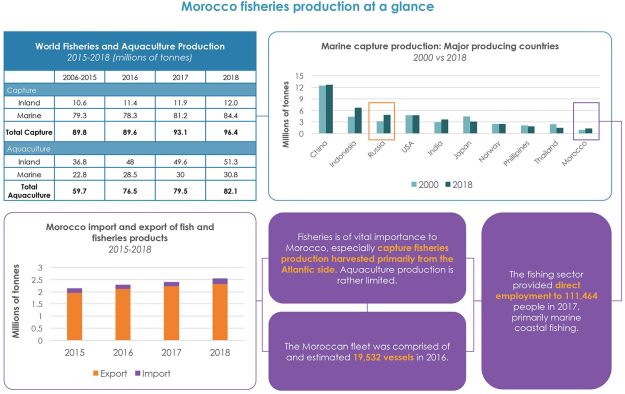1. MOROCCO'S MARINE SECTOR RECEIVES A BOOST AS RUSSIA AND EUROPEAN UNION INVEST
Morocco's marine sector has received a welcome boost, as Russia and the European Union (EU) have reaffirmed cooperation initiatives. Early in December, the Moroccan government approved a maritime-fisheries cooperation agreement with Russia, focusing on the principles of cooperation in the preservation and exploitation of fishery resources of the Moroccan Exclusive Economic Zone. This additionally outlines the conditions for the operation of Russian fishing vessels in the areas off the Atlantic coast, as well as shapes the cooperation between the two relating to scientific fisheries research. The agreement serves as a driving force to develop new fishing techniques, technologies and aquaculture, and further bolster bilateral relations. In similar fashion, Morocco and the EU have agreed to cooperate in marine research and innovation. Morocco has geostrategic importance as it borders both the Atlantic Ocean and the Mediterranean Sea, and cooperation with the EU will develop understanding of marine ecosystems and promote scientific marine research within the country.

Source: Food and Agriculture Organisation, 2020
2. GHANA AND SOUTH AFRICA INVEST IN LOGISTICAL INNOVATION TO IMPROVE MOVEMENT OF GOODS
Logistical innovation has come to the fore recently, as multiple countries across Africa have invested to improve the movement of goods. The Ghanaian Aviation Ministry has partnered with the International Freight Drone (IFD) organisation, to deploy freight drone technology, which will assist the movement of goods within the country. The freight drones are expected to carry 10-tons of shipping containers, over 700km. This initiative will also facilitate the movement of goods from rural areas to cities. Similarly, Renergen, a South African natural gas producer, has partnered with Henred Fruehauf, a trailer manufacturer, to develop a zero-emissions solution for cold-chain logistics. The solution uses liquefied natural gas, which has multiple benefits, including the use of diesel dual fuel as well as removing the need for refrigeration. Projections note that up to 23% of the total fuel bill will be saved in parallel to cutting around 36 tons of carbon dioxide emissions.
3. NOKIA TO EXPAND 5G IN EAST AND WEST AFRICA
Finnish telecom giant Nokia has increasingly become more active in participating in the continent's move toward 5G technology. The month of December saw several announcements in this regard starting with Kenya, where the company partnered with Airtel Kenya to modernise 4G and 5G infrastructure in Nairobi. Nokia's network will offer Airtel Kenya the option to smoothly transition to 5G, offering users enhanced connectivity and providing access to high-speed data services. Through Nokia's innovative solutions, Airtel Kenya users will also profit from capacity benefits such as enhanced voice and data services. Concurrently, Togocom, a mobile operator in Togo, has selected Nokia to deploy 5G across the country. The capital city Lomé has seen the launch of a 5G network, the first in West Africa. The partnership will reinforce Togocom's market leading position in the country, as well as future-proof its infrastructure and provide enhanced connectivity for its users.
4. TELKOM VENTURES INTO FINTECH INDUSTRY IN OFFERING CUSTOMERS E-WALLET SERVICE
Telkom, South Africa's national telecommunications company, has continued to diversify its operations by launching the Telkom Pay Digital Wallet, an e-wallet service for its users. Amongst its features, the mobile-based platform allows users to send and receive money through WhatsApp. Money can be sent to anyone on the user's contact list and can serve as a cashless point-of-sale option for merchants. An additional feature of the e-wallet is the ability to buy airtime and electricity through WhatsApp. The platform will increase convenience for Telkom users, as it's easily accessible through a mobile phone and looks to drive the use of cashless payments through a 'scan and pay' system for goods with QR codes. Despite the negative implications of the Covid-19 pandemic, Telkom has used this to its advantage and ventured into the micro-insurance space as well as the mobile-streaming service sector by launching funeral cover and TelkomOne, respectively. The diversification by Telkom has continued to strengthen its position as a market leader in South Africa.
Click here to continue reading . . .
The content of this article is intended to provide a general guide to the subject matter. Specialist advice should be sought about your specific circumstances.

